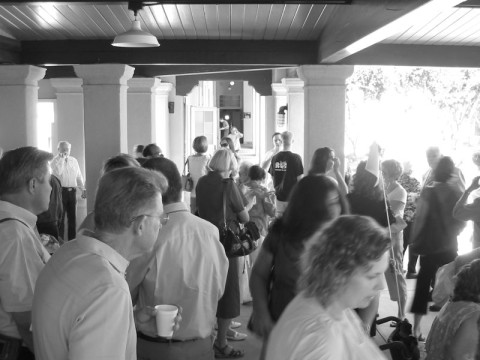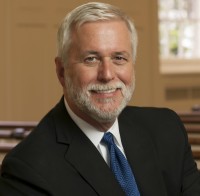Holy small talk
I tarried at the door of the sanctuary following worship as people said things like “Pastor, Bob is having surgery on Wednesday. Can you stop by the hospital?” But as soon as possible I ran to my office, took off my vestments and made my way to the fellowship hall, where the congregation was already delighting in our annual chili lunch. Every year when I wake up on this morning I think, “Really? Chili Sunday?” I can put Third Sunday after Epiphany at the top of the bulletin if I want, but everybody in the congregation knows that at long last it is Chili Sunday.
We are a liturgical and unapologetically formal congregation. Most of the people in the pews dress up in their Sunday best. We’re polite and hospitable, but not laid back. If I were to suggest that worshipers hold hands while we all sing a chorus of “Alleluia,” more than one member would go into cardiac arrest. It took me a while to figure this out, but our congregation finds comfort in formality—especially when we are approaching God. So it’s ironic that only Easter surpasses Chili Sunday for worship attendance.
Read our latest issue or browse back issues.
Members are invited to make their favorite chili recipe and bring it in a Crock-Pot to church. The staff and volunteers set the serving bowls of chili out on long serving tables with little placards that identify the person who prepared each bowl. The beef chili is on one table while the turkey, chicken and vegetarian chili are on others. People hurry to the fellowship hall after worship, plunge into this banquet and find their way to seats at round tables.
By the time I arrive, people are lost in conversation. As the pastor I butterfly around their small talk. I used to hope that they were all talking about the lofty themes of the sermon. I imagined them asking each other, “So what do you think he meant by the grace of God?” or “What does that have to do with Afghanistan?” or at least, “Have you heard that Bob is having surgery Wednesday?” But I’ve learned to raise my expectations.
It is over bowls of chili that the theology becomes incarnational and takes on all of the fleshly concerns they brought to church that day. What they say is, “How is your job search going?” Whether they realize it or not, they’re actually asking each other, “Do you think God cares?” So they are talking about the sermon on grace after all. This is how they raise my expectations of the sermon—they weave it into small talk. After 30 years of pastoral ministry, I have finally discovered the theology of small talk over a bowl of chili. It’s not small at all.
The folding tables in the fellowship hall are not formal pieces of ecclesiastical furniture like the sanctuary’s communion table. But they give us a sacramental glimpse of the Christ who is among us in ordinary places. This has always been one of the church’s best ideas—we are a religion whose faithful need to eat together.
My brother and I, who grew up as pastor’s kids, once tried to count up how many meals we had eaten in a church basement while sitting on metal chairs. I would tell you the number, but it’s too high to be believed. We sat at a table with our friends from the youth group and talked about sports, cars or which one of us was the biggest nerd. Meanwhile our parents were talking about the economy or what to do about the church lawn or why their teenagers gave them so many worries.
Jesus wants to enter all of this small talk just as much as he does our concerns about war-torn countries or Bob going to the hospital this Wednesday. The Gospels account for less than a year of his three-year ministry on earth. That means that at the end of two out of three days Matthew, Mark, Luke and John looked at each other and said, “Don’t bother writing about today.” Even the Savior had laundry days. But that sanctifies the ordinary things that take up most of our lives.
Jesus may appreciate my sermons that work out the dynamics of being adopted into the triune communion, but I doubt they impress him. This theology is a critically important message of hope, and I work very hard to get it right, but I have a hunch most preaching is met by a divine shrug that says, “Yeah, that’s about right.” What excites Jesus is to sneak into a conversation over a bowl of chili when worship is over.
Worshiping with elegance is our congregation’s way of paying attention to “Holy, Holy, Holy, Lord God Almighty.” But people crowd into the fellowship hall for a bowl of chili because their souls hunger for an ordinary variety of holiness. We expect to find Jesus the Savior in the church sanctuary, hospital or places of crises. We yearn to find him on laundry day.








